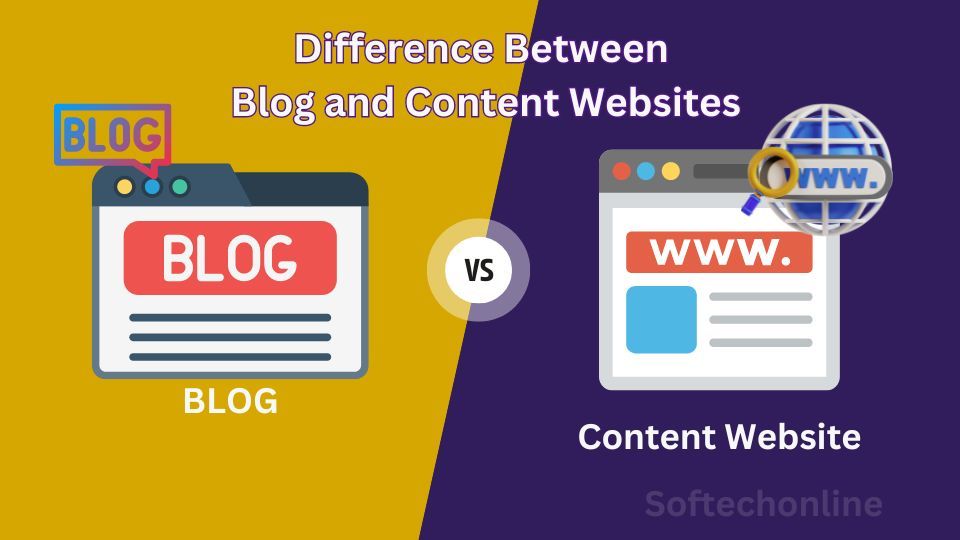When it comes to creating an online presence it is important to know the Difference Between Blog and Content Websites, there are various ways to showcase your content and engage with your audience. Two popular options are blogs and content websites. While they may seem similar at first glance, there are some key differences that set them apart. In this article, we will explore the distinctions between blogs and content websites, helping you make an informed decision about which option is best for your needs.
What is a Blog?
A blog is a type of website that focuses on regularly publishing articles or posts in a chronological order. Blogs are typically written by individuals or small groups and are often more personal in nature. They provide a platform for sharing opinions, experiences, and expertise on a specific topic or niche. Blogs are known for their conversational style and often include a comments section for readers to engage with the author and other readers.
One of the defining features of a blog is its frequent updates. Bloggers usually publish new content on a regular basis, whether it’s daily, weekly, or monthly. This consistent flow of fresh content helps to attract and retain readers, as they know they can expect something new each time they visit the blog.
Blogs also tend to have a more informal tone compared to content websites. Bloggers often write in a conversational style, sharing their thoughts and opinions in a relatable manner. This personal touch helps to create a connection with the audience and encourages engagement.
What is a Content Website?
A content website, on the other hand, is a broader term that encompasses various types of websites that focus on providing informational or educational content. Content websites can be created by individuals, businesses, or organizations and cover a wide range of topics. Unlike blogs, content websites are not limited to a chronological order and can have a more structured navigation system.
Content websites are designed to provide valuable and evergreen content to their audience. They aim to educate, inform, and entertain readers with high-quality articles, guides, tutorials, or other forms of content. Content websites often have multiple sections or categories, making it easier for users to navigate and find the information they are looking for.
Unlike blogs, content websites may not have a comments section or encourage direct interaction with readers. However, they may provide contact forms or other means of communication for users to get in touch with the website owner or the team behind the content.
Key Difference Between Blog and Content Websites
Now that we have a basic understanding of what blogs and content websites are, let’s summarize the key differences between the two:
- Structure: Blogs are often presented in a chronological order, with the most recent posts appearing first. Content websites, on the other hand, have a more structured navigation system and may categorize content based on topics or themes.
- Tone and Style: Blogs tend to have a more informal and conversational tone, while content websites often adopt a more professional and authoritative style.
- Frequency of Updates: Blogs are updated more frequently, with new posts being published on a regular basis. Content websites may have less frequent updates, focusing on creating evergreen content that remains relevant over time.
- Interaction: Blogs usually have a comments section, encouraging readers to engage with the author and other readers. Content websites may not have a comments section but may provide other means of communication.
Watch More Video contents on our Channel
Here’s a table summarizing the key differences:
| Feature | Content Website | Blog |
|---|---|---|
| Purpose | Informative, often commercial | Share thoughts, opinions, news |
| Structure | Well-defined, categorized | Less formal, chronological |
| Update Frequency | Varies, may include evergreen content | More frequent, regular updates |
| Examples | Company website with content sections, educational websites | Personal blogs, industry blogs, travel blogs |
Which Option is Right for You?
Deciding between a blog and a content website depends on your goals, content strategy, and target audience. If you want to share personal experiences, opinions, or regularly update your audience with new content, a blog might be the best choice. On the other hand, if you aim to provide valuable and evergreen content in a more structured manner, a content website may be a better fit.
Ultimately, the decision comes down to your preferences and the nature of the content you want to create. Both blogs and content websites have their own advantages and can be effective in reaching and engaging with your audience. Consider your goals, target audience, and content strategy to make an informed decision that aligns with your needs.
In essence:
- Think of a content website as a well-organized library with informative resources.
- Think of a blog as a dynamic conversation happening online, with fresh content added regularly.
Overlaps and Exceptions:
- Some websites might have a blog section where they publish fresh content alongside static informative pages.
- Not all blogs are personal; some businesses or organizations use blogs for content marketing purposes.
Ultimately, the distinction between a content website and a blog can sometimes be blurry. The key lies in understanding the website’s primary goal and how it delivers content to its audience
Read more Tech Stuff at https://softechonline.in/
